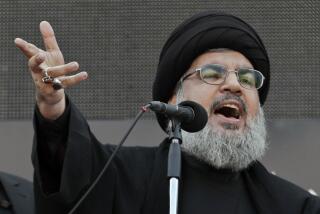Egypt’s President Offered Unity of Purpose : Arabs Wistful for Nasser’s Leadership
- Share via
CAIRO — Nearly 15 years after his death Gamal Abdel Nasser remains a legend of giant proportions in an Arab world that longs for the leadership he offered and the Arab pride he engendered.
Nasser, Egypt’s president from 1953 until his death from a heart attack in September, 1970, would have been 67 years old on Jan. 15 and in observance of his birthday scores of life-size Nasser posters have appeared on alley walls throughout Cairo. His name has been mentioned in media commentaries from Libya to Lebanon.
In Kuwait, a street and a park are named for him. In the poor sections of Cairo, a framed portrait of him can be found in almost every home. In Libya, the head of state, Col. Moammar Kadafi, still worships Nasser as his mentor. In Lebanon, the members of a Muslim militia group call themselves Nasserites.
“If anything, Nasser’s popularity is growing,” Mustafa Sayed, a political scientist at Cairo University, said recently. “This, I think, indicates a certain nostalgia for the past, but a lot of people who feel this way may not remember the bad times.”
Hero of Arab World
Nasser was the one of the Arab world’s heroes. And although scholars still debate whether history will judge his contribution positively or negatively, there is consensus on one major point: he brought fundamental and irreversible change to Egypt and the Mideast.
When a group of “Free Officers” overthrew the Egyptian monarchy in 1952, the Arab world was for the most part pro-Western; communism and radicalism were virtually unknown concepts in the region. The following year, Col. Nasser emerged as the group’s undisputed leader, and with words similar to those later spoken by John F. Kennedy, he rallied his people toward his goal of uniting the Arab world.
“I come to you not with bright promises,” he once said, “but rather with difficult plans of action. . . . What I offer is a great and arduous responsibility which I want to place on your shoulders. I do not come to give to you but to ask from you.”
What Nasser gave to the Arabs was a voice, a belief in themselves. Chain smoking American cigarettes, he would speak for hours of Arab unity, of nonalignment, of social justice, and in doing so he filled a leadership vacuum, a vacuum that to this day has been filled by no other Arab leader.
Remained Incorruptible
He nationalized the Suez Canal in 1956 and withstood an attack by France, Britain and Israel. He turned to the Soviet Bloc for weapons and the backing to build the Aswan Dam when shunned by the West. He took land from the rich and gave it to the poor and instituted free education for all. He remained incorruptible, staying throughout his presidency in the modest house on the outskirts of Cairo where he had lived as a colonel.
Many political scientists attribute Nasser’s renewed popularity today more to the ideas he espoused than to the things he accomplished. It comes at a time when the Arab world is divided into so-called moderate and radical camps, when the region’s most influential country, Egypt, is officially isolated because of its peace treaty with Israel, when presidents are survivors instead of innovators, when nationalism is becoming a stronger force than Pan-Arabism.
“I think there is a general feeling in the Arab world that things haven’t gone especially well,” an American university professor said.
“The Arabs have lost control of the oil market. They can’t agree on much, can’t even get together to hold an Arab League summit. There’s no country, no president, capable of giving the region a direction. There’s no sense that anyone can rein in Israel. The fundamentalists are a worry. The Iran-Iraq war threatens the stability of the gulf. Morocco, Tunisia, Egypt have all experienced food riots in the last year or so. The idea of Arab unity is becoming less and less plausible.
Offered Common Purpose
“So you put Nasser against a backdrop of 1985’s frustrations and problems and what he offered--a common Arab purpose, a clear direction, strength in nonalignment--sounds very appealing.”
Nasser’s failures, though, were also significant. His 1958 union with Syria lasted only three years. He sent troops to Yemen in 1962 and became bogged down in a civil war. He led the Arabs into battle against Israel in 1967 and was trounced; the humiliation of that defeat is part of the Arab psyche to this day. His nationalization of the domestic economy and his creation of a quasi-police state left financial and social wounds from which Egypt has not yet recovered.
These disasters are seldom mentioned any more. As with many past heroes, the image of proudly remembered times has become grander with the years.
More to Read
Sign up for Essential California
The most important California stories and recommendations in your inbox every morning.
You may occasionally receive promotional content from the Los Angeles Times.













